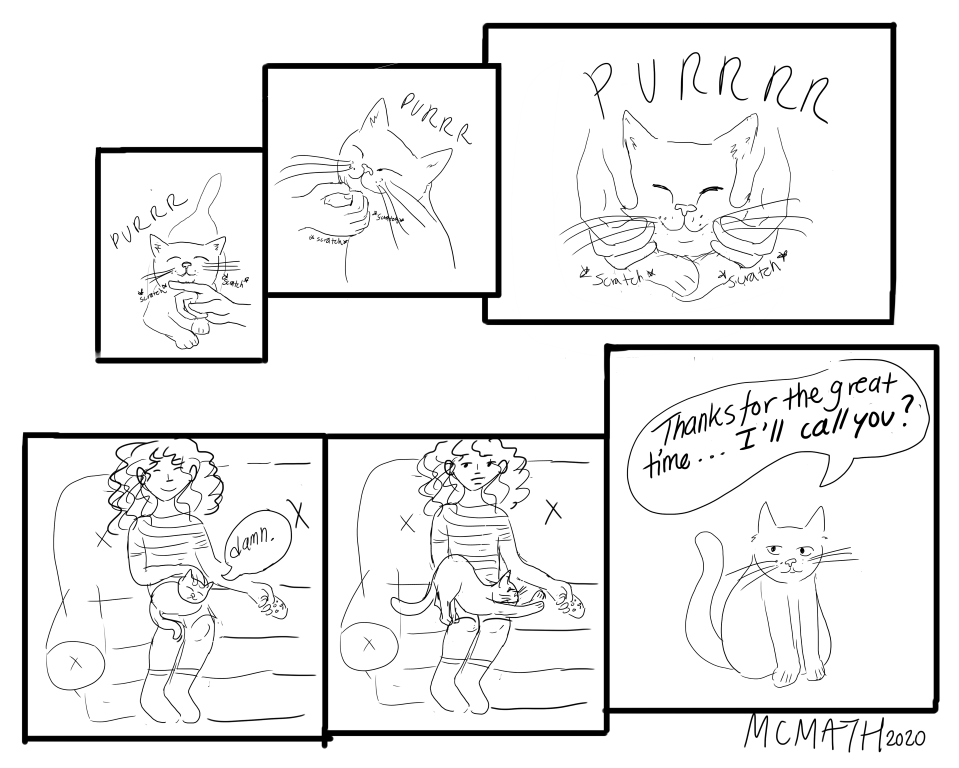The Other Press and other student newspapers are in a very particular position: industry newspapers are feeling the clout of newsprint’s gradual decline, and pandering to advertisers is often necessary to stay afloat. Student newspapers, on the other hand, are in the comfortable position of subsisting largely off a student levy. While the Other Press gets the occasional advertisement, our most regular advertiser is the Douglas Students’ Union, and our business relationship with the union is so long-standing that the last few years have seen more verbal contracts than formalized ones.
So, we avoid pandering to advertisers because we can afford to pay our staff irrespective of ad money—and we print our papers with gloss to boot.
There are occasions though where I’m put in the uncomfortable position of navigating the newspaper’s integrity. It’s not uncommon for organizations to contact myself or one of our section editors with an idea for a story; that’s generally a perfectly fine, symbiotic relationship wherein we’re always hunting for stories to cover, and they benefit from our coverage. The issue of integrity arises when they contact me asking for both an article and an advertisement.
I struggled with this when I first encountered the request, and I’m sure I will continue to struggle with it. Essentially though, my policy is generally to offer either an advertisement or an article, but not both. Here’s why:
When money exchanges hands, there’s a potential for conflict of interest: because we’re receiving money, if we run an article on a product/service/event, our coverage could be perceived as dependent on that exchange of funds. The lines become blurred between the sponsored and unsponsored portions, where ideally a newspaper should function independent of outside influence.
While I stand by our staff in their ability to report without bias, it’s something we strive to be conscious of. In the past, we’ve held off on publishing articles from staff writing about organizations they’re a part of; we also try to be wary when accepting ads for events where the organizers are also requesting coverage.
Because I accept a percentage of the profits for advertisements that I arrange, I don’t feel comfortable with then guaranteeing that a section editor will run a piece on an event, product, or service. I wouldn’t guarantee coverage and override a section editor’s agency like that anyway, but it would be considerably worse if I were to do so while accepting a cut of the profits.
My general policy of course can’t be the be-all-and-end-all. Already, in my germinating term as EIC, I’ve made allowances based on context: while I won’t guarantee additional coverage for an advertiser, I also won’t deny a section editor’s covering of an event because of one. It’s a balancing act where I try to do what’s best for the paper while not dictating coverage either way based on who’s paying. Ideally, advertisements and articles would exist in their separate boxes on the paper’s layout, ne’er the t’wain shall meet. This is reality though, and sometimes the distinctions don’t remain as perfectly defined as I would like.
The reason this is such sensitive territory is because of the rise in native advertising. Essentially, native advertising is when an ad has been camouflaged into an article so that you can’t tell the difference. It’s those articles that feature a tiny “post sponsored by [insert company/group]”—supposedly the disclaimer to alert readers that they’re being duped.
Last Week Tonight with John Oliver did a report on native advertising a while back, and it was astounding to see that Goliaths of the publishing world like the New York Times were printing native advertising. Even when the article is important, or well-done and well-researched, at the end of the day it’s still sponsored to conclude with a specific point; clearly that’s dangerous when you purport to report on facts.
The Other Press and other student newspapers are in a very particular position: we’re developing some of the next generation of reporters. I don’t pretend that I’ll have a profound and long-lasting impact on our writers, and acknowledge that the Other Press’ influence is largely restricted to the Douglas students who are aware of our existence. Still, my hope is that fostering a conscientious attitude when it comes to advertising will do something. I’m probably idealistic—the reality is, as John Oliver stated, “a press cannot be free and independent if nobody is willing to pay for it”—but it’s the little bit that I can do.
Hello gorgeous,
Natalie Serafini



